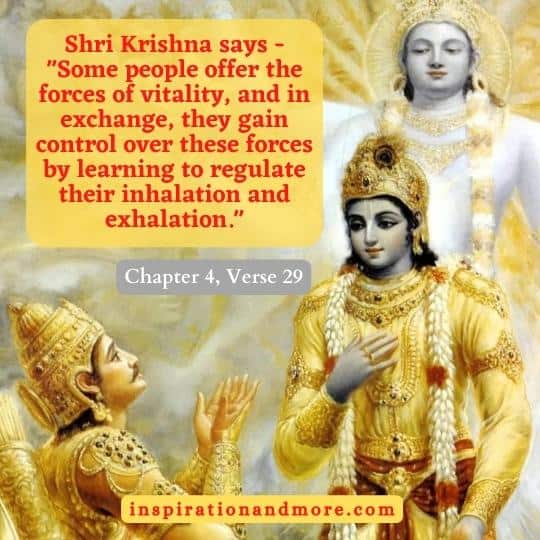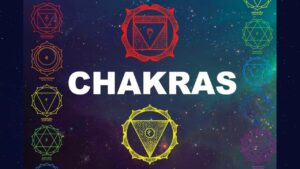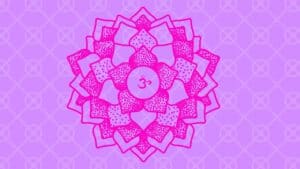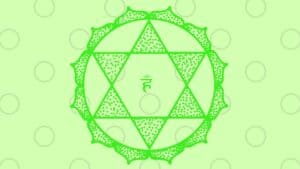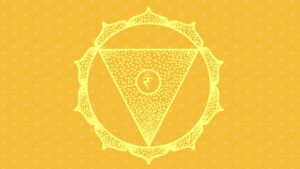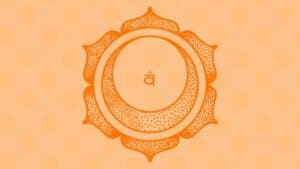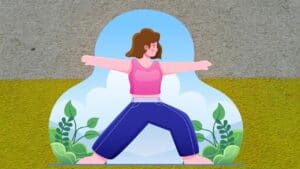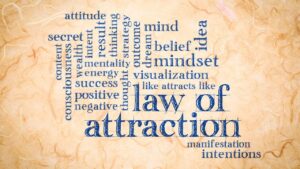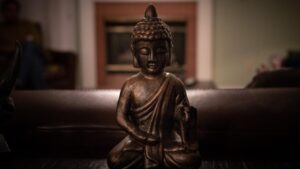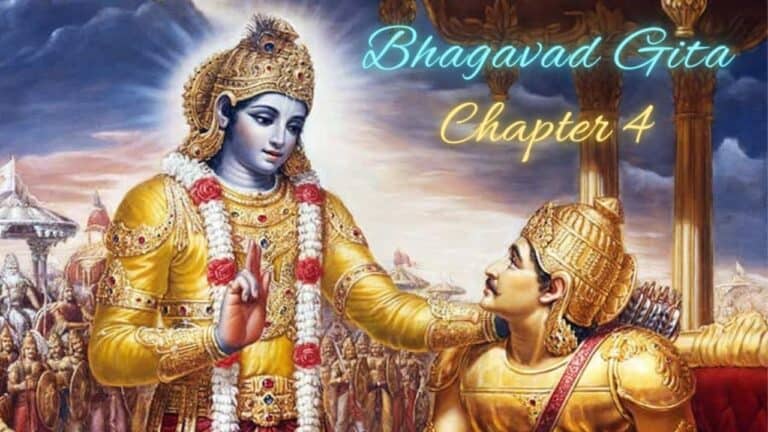
This article contains the verses from Shrimad Bhagavad Gita Chapter 4.
Links to remaining chapters can be found at the end of the article.
Shrimad Bhagavad Gita Chapter 4
KRISHNA
#1
Vivasvat was the recipient of my revelation of this ageless mystery. Vivasvat taught Manu, and Manu taught Ikshvaku.
#2
As a result, Arjuna, along with other illustrious sages, yoga was taught as part of an ongoing tradition. However, over the course of time, the practise of yoga faded away from the world.
#3
This teaching conceals a profound secret in its lore. Because you are my friend and a devotee, I have taken the time to explain them to you today.
ARJUNA
#4
You were born a very long time after Vivasvat; he passed away a very, very long time ago. Why do you say that you taught this type of yoga when you first started out?
KRISHNA
#5
Both you and I, Arjuna, have experienced many lives in the past. You have forgotten, but I can recall every single one of them.
#6
My essential self has never been born and it never will. I am the Lord, who resides in each and every living thing. I am able to materialise myself as a concrete form thanks to the potency of my own personal maya.
#7
Whenever dharma falls into disrepair and the meaning of life is lost sight of, I make my presence known on the earth.
#8
I am born anew at the beginning of each age to defend the righteous, to vanquish the wicked, and to restore dharma.
#9
Those who know me as their own divine Self are able to break through the belief that they are the body and that they are not reborn as separate creatures when they realise that they are not the body. Arjuna, you are one of those who are joined to me.
#10
Many people have attained the state of unity in me, having been freed from selfish attachment, fear, and anger, having been filled with me, having surrendered themselves to me, and having been purified in the fire of my being.
#11
Just as they come closer to me, so do I come closer to them. All paths, Arjuna, lead to me.
#12
Those who want to be successful in their endeavours worship the gods, and their wishes are quickly granted when they take part in activities that take place in the world of mortals.
#13
I was the one who initially conceptualised the distinctions between caste, guna, and karma. I am the reason for their existence, but in and of myself, I am immutable and above all actions.
#14
Because I am not emotionally attached to the outcomes of my actions, I am not affected by them in any way. Those who comprehend and put this into practise are those who truly live in freedom.
#15
Ancient people who sought liberation through ascetic practise took action because they were aware of this truth. You, too, have the ability to follow in the footsteps of those ancient wise men and women by leading an active lifestyle.
#16
What exactly is meant by the terms action and inaction? The wisest people in history have been stumped by this question. I will reveal to you the key to effective action, which will enable you to break free of your enslavement.
#17
Understanding the real character of action can be challenging. You need to have a clear understanding of what constitutes action and what does not constitute action, as well as the types of actions that should be avoided.
#18
The wise are aware that there can be action amidst inaction and inaction amidst action. Both of these states are possible. Their awareness is unified, and every action that they take is carried out with full consciousness.
#19
The enlightened sages consider a person to be wise when all of his endeavours are free from anxiety about the results, and all of his egotistical desires have been extinguished in the flames of knowledge.
#20
The wise, who never lack for anything, have given up on any and all outside supports. Their safety is unaffected in any way by the outcomes of their actions; in fact, even when they are acting, they are not really accomplishing anything at all.
#21
Because they are free from all expectations and all feelings of possession, and because both their mind and their body are firmly under the control of the Self, they do not commit sin by performing physical action.
#22
Those who have transcended the contradictions that are inherent in life are able to live without restrictions. They are alike in success and failure, and they are content with whatever comes to them because they are not competing with anyone.
#23
They have no attachments to themselves, and their minds are not clouded by ignorance; they are free. They approach every task with the mindset that they are serving others, which causes their karma to be cleared.
#24
The act of making an offering is known as Brahman, as is the thing that is made an offering of. In the flames of Brahman, Brahman makes the offering of the sacrifice. Those who are able to recognise brahman in each and every action are on the path to brahman.
#25
Some people who aspire to be gods, worship them by presenting material sacrifices. Some people worship Brahman by offering sacrifices of selfless service to the fire.
#26
Some people give up all the pleasure that can be derived from their senses, offering them as a sacrifice in the process of learning to control those senses. Others partake of sense objects, but they do so only in order to offer them as fuel for the senses’ internal fire.
#27
Some people offer the operations of the senses and the vital forces by means of the flame of self-control, which is kindled along the way to knowledge.
#28
Some promise prosperity, while others promise mental anguish and physical hardship. Some people make the offering of meditation, while others make the offering of taking vows and gaining knowledge through the study of the scriptures.
#29
Some people offer the forces of vitality, and in exchange, they gain control over these forces by learning to regulate their inhalation and exhalation.
#30
Others contribute to the forces of vitality by learning to control their senses and emotions. All of these have an understanding of what it means to be of service, and they will be purified of their imperfections.
#31
The only thing that can truly satisfy a person’s hunger is to be of service to others; this is the path that leads directly to Brahman, the ultimate reality. Those who do not seek to serve others, however, will never find a place for themselves in this world. Arjuna, how is it possible for them to feel at ease in any future world?
#32
These offerings are the result of action, and each one leads humanity further along the path that leads to Brahman. You will reach enlightenment once you have this comprehension.
#33
Arjuna, the offering of wisdom, is superior to the offering of any material thing, because the end goal of all actions is to achieve spiritual wisdom.
#34
Approach those people who have figured out the meaning of life and ask them questions while showing them reverence and devotion; they will teach you the wisdom that you seek.
#35
Once you have it, you will never again allow yourself to be misled by anything else. You will see every living thing within the Self, as well as every living thing within me.
#36
Arjuna, even if you were the most sinful of sinners, you would still be able to cross beyond all sin using the raft of spiritual wisdom.
#37
In the same way that the heat of a fire can reduce wood to ashes, the fire of knowledge can reduce all karma to ashes.
#38
Nothing in this world can purify like wisdom gained through spiritual practise. It is the perfection that is attained over the course of time by following the path of yoga, which is the path that leads to the Self that lies within.
#39
Those who place emphasis on acquiring wisdom, whose faith is strong, and whose senses have been honed will do so, arrive at an unshakeable state of tranquil with a lightning speed.
#40
But those who are uninformed, lack the ability to make decisions, and have no faith will squander their lives. They are incapable of finding happiness in this world or any other world.
#41
Those who are established in the Self have let go of any egotistical attachments they may have had to their actions and have used spiritual wisdom to dispel any uncertainties they may have had. They are free in their actions.
#42
Arjuna, use the sword of spiritual wisdom to cut through this uncertainty that is residing in your own heart. Arise and begin your journey along the yoga path!
Related Reading:
Shrimad Bhagavad Gita Chapter 1 Verses
Shrimad Bhagavad Gita Chapter 2 Verses
Shrimad Bhagavad Gita Chapter 3 Verses
Shrimad Bhagavad Gita Chapter 5 Verses
Shrimad Bhagavad Gita Chapter 6 Verses
Shrimad Bhagavad Gita Chapter 7 Verses
Shrimad Bhagavad Gita Chapter 8 Verses
Shrimad Bhagavad Gita Chapter 9 Verses
Shrimad Bhagavad Gita Chapter 10 Verses
Shrimad Bhagavad Gita Chapter 11 Verses
Shrimad Bhagavad Gita Chapter 12 Verses
Shrimad Bhagavad Gita Chapter 13 Verses
Shrimad Bhagavad Gita Chapter 14 Verses
Shrimad Bhagavad Gita Chapter 15 Verses
Shrimad Bhagavad Gita Chapter 16 Verses

